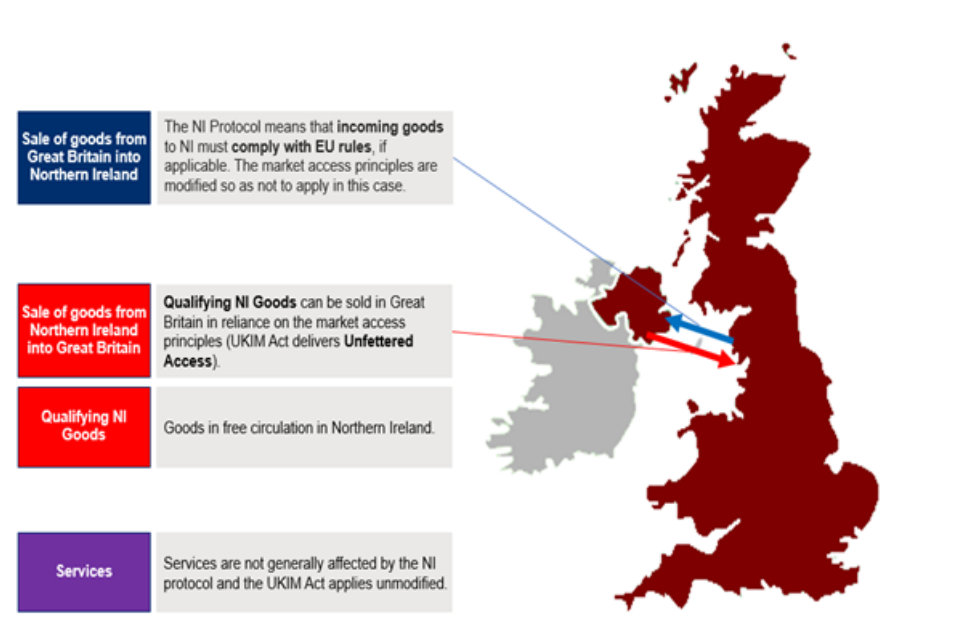An introduction to the UK Internal Market Act (HTML)
Updated 16 February 2022
This information will help you understand how the UK Internal Market Act supports UK industry.
How does it support your business?
- If you sell goods or provide services across the UK, then the UK Internal Market Act ensures that you can continue to do so.
- Where you or your employees hold professional qualifications, the Act ensures you may by default practice in other parts of the UK (exclusions and alternatives apply).
- If you comply with regulations permitting the sale of goods or provision of services in one part of the UK, your goods will be considered compliant with requirements across the UK.
- You can do business with the certainty that regulatory requirements cannot discriminate against your goods and services based on where you choose to locate in the UK.
The information contained in this booklet is not designed to be exhaustive, nor constitute legal advice.
Market Access Principles
The market access principles of mutual recognition and non-discrimination are designed to prevent potentially harmful trade barriers to goods, services, and professional qualifications within the UK
How do the market access principles affect the sale of goods?
- Mutual Recognition: A good, which complies with regulation permitting its sale in the part of the UK it is produced in or imported into, can be sold in other parts of the UK, without complying with equivalent regulation there.
- Non-Discrimination: Regulatory requirements that discriminate against a good from another part of the UK, whether directly or indirectly, will not be enforceable.
There are some exclusions to the market access principles, including existing regulations, and goods supplied for the purpose of performing a function of a public nature.
Exclusions for goods are listed in Schedule 1 of the Act, e.g., certain emergency food safety and animal and plant health regulations
How do the market access principles affect service providers?
- Mutual Recognition: Businesses authorised to provide a service by a regulator in one part of the UK do not need further authorisation to provide their services in other parts of the UK.
- Non-Discrimination: Regulatory requirements that directly or indirectly discriminate against a service provider from another part of the UK will not be enforceable.
Any existing regulations (that is, those that were already in force on 30th December 2020) are excluded from the market access principles for services. Exclusions for services are listed in Schedule 2 of the Act and include health, public functions, transport services and legal services.
How do the market access principles affect professional qualifications?
- Mutual Recognition: There is a presumption of automatic recognition of professional qualifications.
- Non-discrimination: There must be no discrimination when assessing the compatibility of qualifications if the automatic system is disapplied.
Existing provisions (that is, those that were already in force on 30th December 2020) are excluded from the market access principles for professional qualifications, as are legal services and schoolteachers. Some professionals may need to take steps to requalify.
Northern Ireland Protocol and the UK Internal Market Act
- Goods moving to Northern Ireland must follow certain EU rules. The market access principles are modified so as to not apply in these cases.
- Qualifying Northern Ireland Goods can be sold in Great Britain in reliance on the market access principles (although certain exclusions apply - see further guidance).

Exclusions
There are exclusions to the UKIM Act where the market access principles will not apply. This list is a guide and should not be taken as legal guidance.
- Existing differences, requirements, or regulations are excluded from the UKIM Act.
- Exclusions for goods are listed in Schedule 1 of the Act, an example being Sanitary and Phytosanitary emergencies relating to animal and plant health.
- Exclusions for services are listed in Schedule 2 of the Act, notably health, public functions, transport services, and legal services.
- Professional qualifications exclusions include the legal professions, schoolteachers and existing provisions.
Office for the Internal Market
The OIM is an independent body that sits within the Competition and Markets Authority. It monitors the UK internal market and provides non-binding reports and technical advice to both the Devolved Administrations and UK Government on the economic impact of their regulatory proposals and regulations.
How does the Office for the Internal Market interact with businesses?
- Businesses and other stakeholders will have an opportunity to tell the OIM their experience of how the UK Internal Market is functioning, through the OIM’s new digital reporting service. This might include any issues in trading or doing business in different parts of the UK.
- The OIM gathers information from businesses, public authorities and individuals to support its reporting functions.
- The OIM does not have the powers to enforce regulation or handle disputes.
- The Act enables the OIM to take appropriate action, including imposing financial penalties to ensure that it can gather timely, complete, and accurate evidence for its advice and reports.
